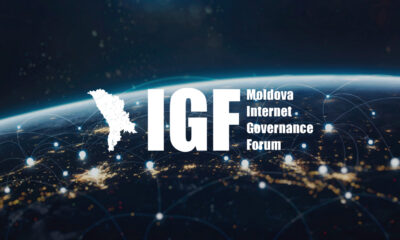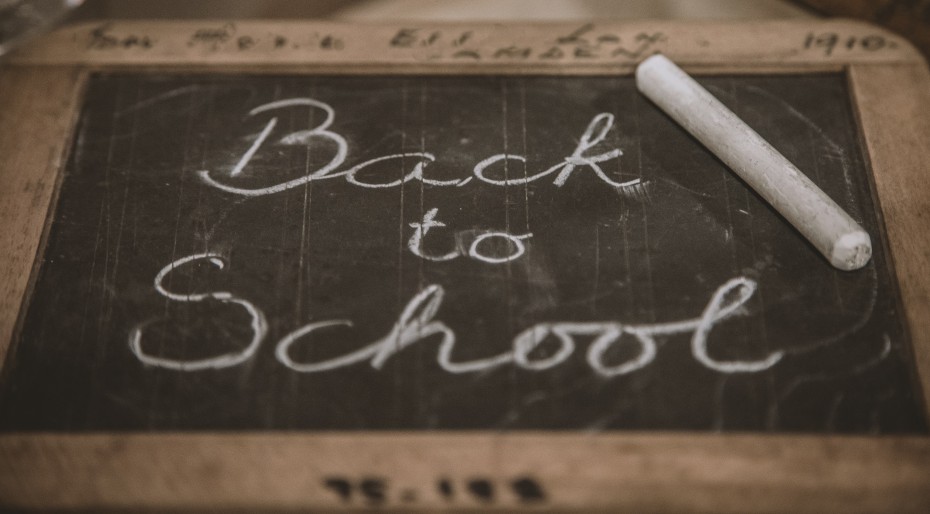
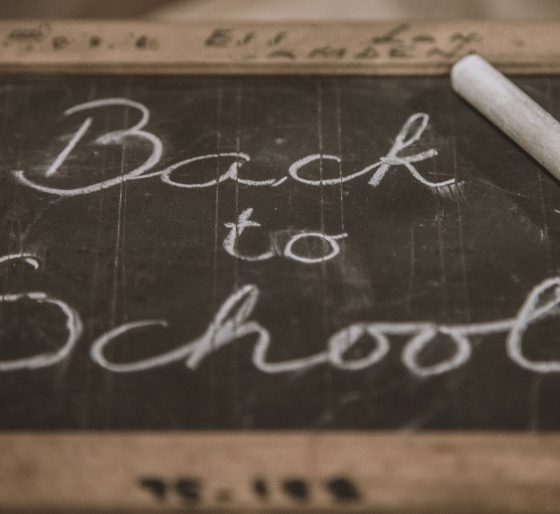
Education
Schooling during the COVID-19 pandemic: trying to meet pupils’ educational needs
A new academic year was started at the beginning of this month. It wasn’t a usual start though. The Ministry of Education, Culture and Research of the Republic of Moldova (MECR) established clear rules regarding the educational process: corridors marked with signs, disinfectants placed in each classroom, and desks arranged to keep the distance between the students. Teachers, students and their parents were asked to wear masks while indoors and respect the schedule and the code of conduct imposed by the school administration.
On August 21, the National Extraordinary Public Health Commission (NEPHC) decided to relaunch the educational process, which was interrupted in March, starting with September 1.
According to the data presented by the ministry, 1233 out of 1252 public and private general education institutions implemented one of the study models requiring physical attendance. 19 educational institutions decided to conduct their activity online, of which 11 institutions were still quarantined, and 8 of them did not resume their activity for various reasons.
1 month after schools’ opening is the proper moment to look into the way schooling is provided nowadays and the efficiency of the measures imposed by authorities.
(Un)prepared school and kindergartens
As the National Agency for Public Health (NAPH) and the Ministry of Health, Labour and Social Protection reported at the beginning of the month, not all educational institutions were fully prepared to start the academic year in time, given the special requirements related to the COVID-19 pandemic.
One week after the beginning of the academic year, 13 educational institutions from all over the country have been put in quarantine, as students and teachers were infected with COVID-19. Also, 29 groups of students from schools across the country were placed in isolation.
Until the middle of the month, 171 groups, 4958 students and 288 teachers self-isolated, while 187 students and 173 teachers tested positive with COVID-19, according to the Minister of Education, Culture and Research, Igor Sarov.

Source: TV8
One of the main provisions of the NAPH says that in case one of the students is diagnosed with the new type of coronavirus, the whole class is put in quarantine for a period of 14 days. The educational process takes place online only. Taking into consideration the reduced access to devices and internet, as well as the growing number of students and teachers placed in self-isolation, a massive remote educational process could became a big trouble again.
See also: 7 ways of re-opening schools in Moldova – the present-day problems of the education system
Pupils, teachers and parents
According to the National Bureau of Statistics, only 41% of the population of Moldova has a computer and only 38.7% have internet access. Also, many Moldovans do not have the technical skills required to figure out how to download, install and use tools needed for remote learning, the UN Moldova reported.
According to an online survey conducted by the Institute of Public Policies (IPP), where 33 500 students, 22 500 parents, 5 350 teachers and 650 managers participated, 80% of country’s teachers and 60% of students needed special training when using online educational platforms and the beginning of the pandemic period.
In order to fix the problem of teachers’ digital literacy, about 72% of all teachers in the Republic of Moldova had online training courses, authorities said.
Due to limited resources from the state budget for equipping schools with computers, international help was sought. For example, the MECR announced a donation from the Republic of Korea: “General education institutions, where computer science classrooms do not correspond to the standards of equipping with information and communication technologies, will benefit from 150 computers,” it was announced in a note of the ministry. 150 computers is far too little for an entire country though.
Even from the first days of the new academic year, it became clear that the established restrictions were adopted without adjusting them to the needs of possibilities of parents. Short-time at kindergartens or several shifts at schools meant creating troubles for parents that would have to take time off work in order to bring their children to or from schools and kindergartens. This was one of the reasons several parents’ organisations protested in front of the Government at the beginning of September, asking for reintroducing the normal schedule and exempting children from wearing masks.
According to the Decision no. 28 of August 28, children are to be accompanied, to and from kindergarten by one and the same person. “The transportation of children/companions in the means of school transport will be organised at the capacity of the number of seats, in compliance with public health measures,” is mentioned in the adopted decision. Therefore, parents are forced to use their own car instead of providing more school transport.
At the same time, more and more parents claimed that the problem of illegal money raising has reappeared in schools. Money for lacking teacher’s laptop or for cleaning and disinfection are raised at schools, the amounts being even higher than before the pandemic.
Election campaign and schools
In the context of the coming presidential elections, schools from the Republic of Moldova became one more ‘campaigning tool’ candidates used.
The MECR adopted an urgent decision on September 17, according to which only students, teachers and employees are allowed to enter in educational institutions. It is forbidden to organise cultural events at school, as well as meetings with politicians. The decision was taken as a consequence of President Igor Dodon actions who visited a school, without wearing a mask while entering a classroom full of students. “Entering a school without mask, shaking hands with the elderly, violates the decisions of the Commission. There is no other way of explaining the defiant gestures towards the whole society,” the Minister of Education, Igor Sarov, commented Dodon’s actions.
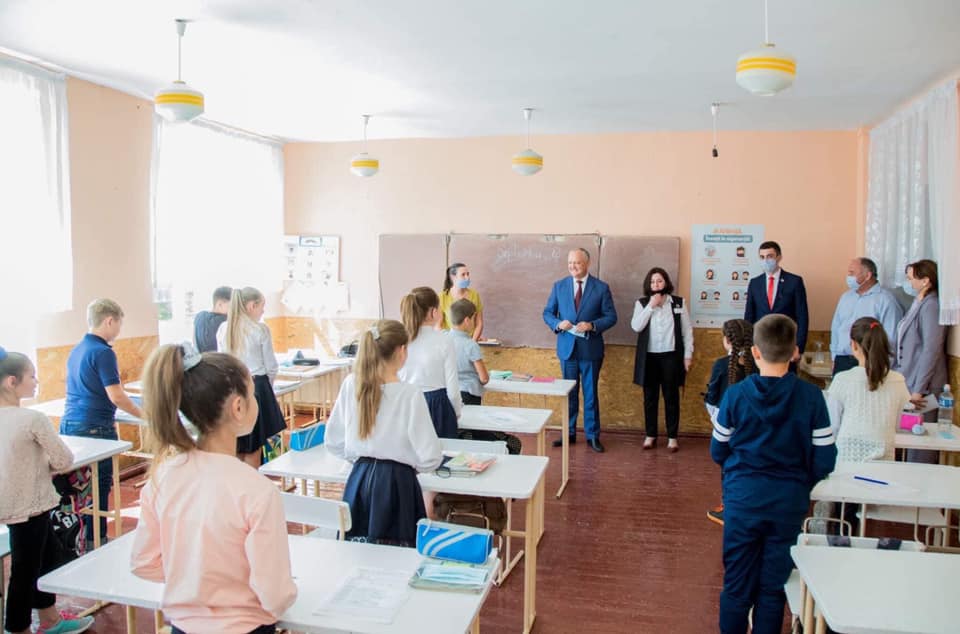
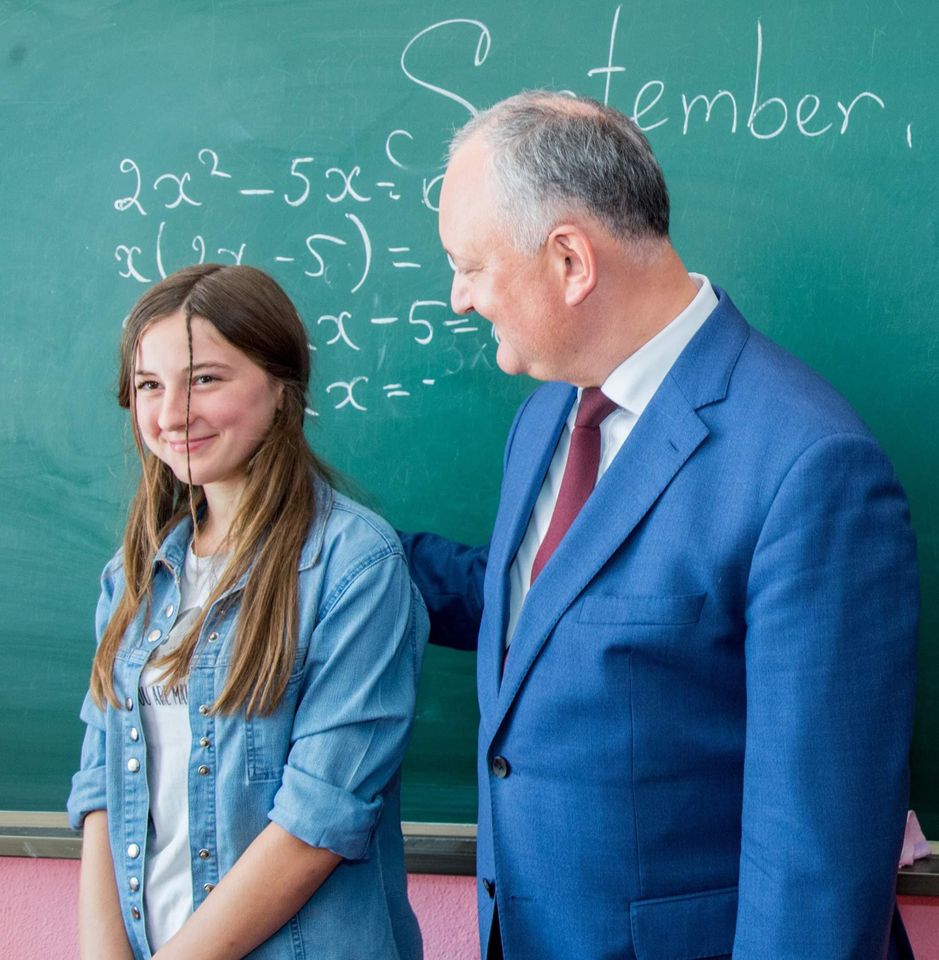
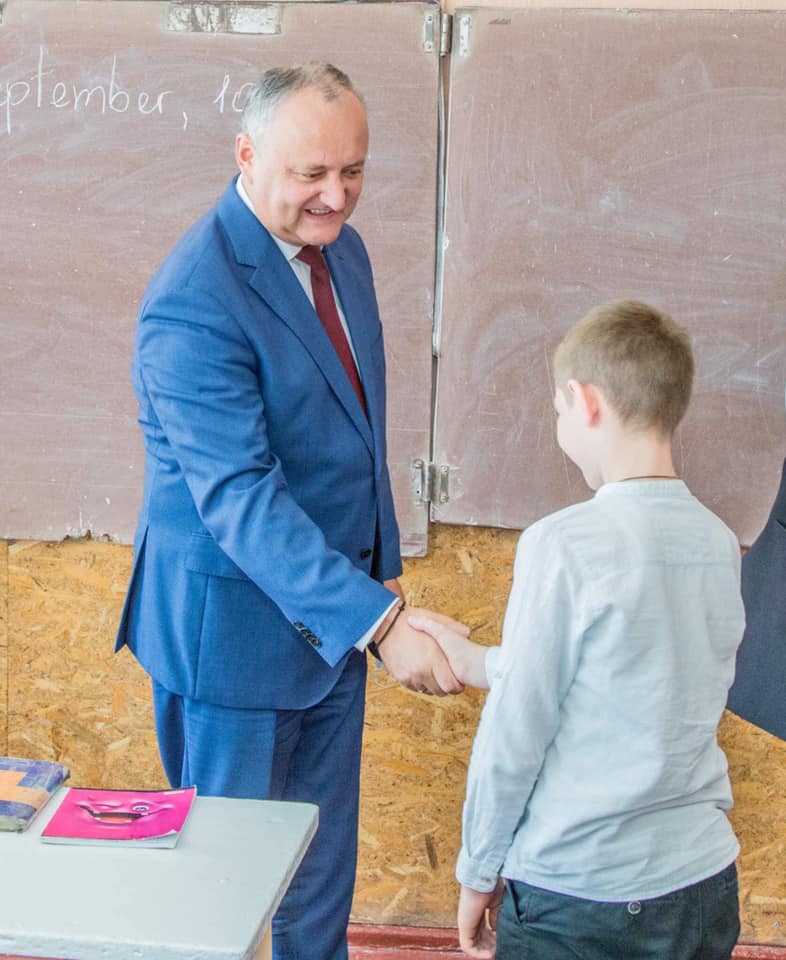
Source: Igor Dodon| Facebook
In his defiance, Dodon said that Minister of Education wasn’t correctly informed. “If he can’t do it, then other political decisions can be made in this regard – to teach him how to do a research. The president of the country was wearing a mask at school and when he spoke to the students he took off his mask, said a few words and put his mask back on. I don’t think I broke any rule,” claimed Dodon.
Another case of using pupils to gain image benefits for political reasons was strongly condemned by the Child Ombudsman, Maia Banarescu: “It is outrageous, immoral to speculate with children in order to obtain image benefits. Children should not be seen as a way to gather likes or votes. Children have rights and human dignity. Adults have the obligation to respect their rights and treat them with the affection, care and attention they need,” said Maia Banarescu.
Several photos were published on social media previously, displaying the president of Riscani district, Vasile Secrieru, along with other politicians and the school administration representatives at an event of inauguration of an inside restroom in a rural school. The photo provoked public outraged reactions.

Source: Vasile Secrieru| Facebook
Photo: Deleece Cook| Unsplash
Society
“They are not needy, but they need help”. How Moldovan volunteers try to create a safe environment for the Ukrainian refugees

At the Government’s ground floor, the phones ring constantly, the laptop screens never reach standby. In one corner of the room there is a logistics planning meeting, someone has a call on Zoom with partners and donors, someone else finally managed to take a cookie and make some coffee. Everyone is exhausted and have sleepy red eyes, but the volunteers still have a lot of energy and dedication to help in creating a safe place for the Ukrainian refugees.
“It’s like a continuous bustle just so you won’t read the news. You get home sometimes and you don’t have time for news, and that somehow helps. It’s a kind of solidarity and mutual support,” says Vlada Ciobanu, volunteer responsible for communication and fundraising.
The volunteers group was formed from the very first day of war. A Facebook page was created, where all types of messages immediately started to flow: “I offer accommodation”, “I want to help”, “I want to get involved”, “Where can I bring the products?”, “I have a car and I can go to the customs”. Soon, the authorities also started asking for volunteers’ support. Now they all work together, coordinate activities and try to find solutions to the most difficult problems.
Is accommodation needed for 10, 200 or 800 people? Do you need transportation to the customs? Does anyone want to deliver 3 tons of apples and does not know where? Do you need medicine or mobile toilets? All these questions require prompt answers and actions. Blankets, sheets, diapers, hygiene products, food, clothes – people bring everything, and someone needs to quickly find ways of delivering them to those who need them.
Sometimes this collaboration is difficult, involves a lot of bureaucracy, and it can be difficult to get answers on time. “Republic of Moldova has never faced such a large influx of refugees and, probably because nobody thought this could happen, a mechanism of this kind of crisis has not been developed. Due to the absence of such a mechanism that the state should have created, we, the volunteers, intervened and tried to help in a practical way for the spontaneous and on the sport solutions of the problems,” mentions Ecaterina Luțișina, volunteer responsible for the refugees’ accommodation.
Ana Maria Popa, one of the founders of the group “Help Ukrainians in Moldova/SOS Українці Молдовa” says that the toughest thing is to find time and have a clear mind in managing different procedures, although things still happen somehow naturally. Everyone is ready to intervene and help, to take on more responsibilities and to act immediately when needed. The biggest challenges arise when it is necessary to accommodate large families, people with special needs, for which alternative solutions must be identified.
Goods and donations
The volunteers try to cope with the high flow of requests for both accommodation and products of all kinds. “It came to me as a shock and a panic when I found out that both mothers who are now in Ukraine, as well as those who found refuge in our country are losing their milk because of stress. We are trying to fill an enormous need for milk powder, for which the demand is high and the stocks are decreasing”, says Steliana, the volunteer responsible for the distribution of goods from the donation centers.
Several centers have been set up to collect donations in all regions of Chisinau, and volunteers are redirecting the goods to where the refugees are. A system for processing and monitoring donations has already been established, while the volunteer drivers take over the order only according to a unique code.
Volunteers from the collection centers also do the inventory – the donated goods and the distributed goods. The rest is transported to Vatra deposit, from where it is distributed to the placement centers where more than 50 refugees are housed.
When they want to donate goods, but they don’t know what would be needed, people are urged to put themselves in the position of refugees and ask themselves what would they need most if they wake up overnight and have to hurriedly pack their bags and run away. Steliana wants to emphasise that “these people are not needy, but these people need help. They did not choose to end up in this situation.”
Furthermore, the volunteer Cristina Sîrbu seeks to identify producers and negotiate prices for products needed by refugees, thus mediating the procurement process for NGOs with which she collaborates, such as Caritas, World Children’s Fund, Polish Solidarity Fund, Lifting hands, Peace Corps and others.
One of the challenges she is facing now is the identifying a mattress manufacturer in the West, because the Moldovan mattress manufacturer that has been helping so far no longer has polyurethane, a raw material usually imported from Russia and Ukraine.
Cristina also needs to find solutions for the needs of the volunteer groups – phones, laptops, gsm connection and internet for a good carrying out of activities.
Hate messages
The most difficult thing for the communication team is to manage the hate messages on the social networks, which started to appear more often. “Even if there is some sort of dissatisfaction from the Ukrainian refugees and those who offer help, we live now in a very diverse society, there are different kind of people, and we act very differently under stress,” said Vlada Ciobanu.
Translation by Cătălina Bîrsanu
Featured
FC Sheriff Tiraspol victory: can national pride go hand in hand with political separatism?

A new football club has earned a leading place in the UEFA Champions League groups and starred in the headlines of worldwide football news yesterday. The Football Club Sheriff Tiraspol claimed a win with the score 2-1 against Real Madrid on the Santiago Bernabeu Stadium in Madrid. That made Sheriff Tiraspol the leader in Group D of the Champions League, including the football club in the groups of the most important European interclub competition for the first time ever.
International media outlets called it a miracle, a shock and a historic event, while strongly emphasizing the origin of the team and the existing political conflict between the two banks of the Dniester. “Football club from a pro-Russian separatist enclave in Moldova pulls off one of the greatest upsets in Champions League history,” claimed the news portals. “Sheriff crushed Real!” they said.
Moldovans made a big fuss out of it on social media, splitting into two groups: those who praised the team and the Republic of Moldova for making history and those who declared that the football club and their merits belong to Transnistria – a problematic breakaway region that claims to be a separate country.
Both groups are right and not right at the same time, as there is a bunch of ethical, political, social and practical matters that need to be considered.
Is it Moldova?
First of all, every Moldovan either from the right or left bank of Dniester (Transnistria) is free to identify himself with this achievement or not to do so, said Vitalie Spranceana, a sociologist, blogger, journalist and urban activist. According to him, boycotting the football club for being a separatist team is wrong.
At the same time, “it’s an illusion to think that territory matters when it comes to football clubs,” Spranceana claimed. “Big teams, the ones included in the Champions League, have long lost their connection both with the countries in which they operate, and with the cities in which they appeared and to which they linked their history. […] In the age of globalized commercial football, teams, including the so-called local ones, are nothing more than global traveling commercial circuses, incidentally linked to cities, but more closely linked to all sorts of dirty, semi-dirty and cleaner cash flows.”
What is more important in this case is the consistency, not so much of citizens, as of politicians from the government who have “no right to celebrate the success of separatism,” as they represent “the national interests, not the personal or collective pleasures of certain segments of the population,” believes the political expert Dionis Cenusa. The victory of FC Sheriff encourages Transnistrian separatism, which receives validation now, he also stated.
“I don’t know how it happens that the “proud Moldovans who chose democracy”, in their enthusiasm for Sheriff Tiraspol’s victory over Real Madrid, forget the need for total and unconditional withdrawal of Russian troops from Transnistria!” declared the journalist Vitalie Ciobanu.
Nowadays, FC Sheriff Tiraspol has no other choice than to represent Moldova internationally. For many years, the team used the Moldovan Football Federation in order to be able to participate in championships, including international ones. That is because the region remains unrecognised by the international community. However, the club’s victory is presented as that of Transnistria within the region, without any reference to the Republic of Moldova, its separatist character being applied in this case especially.
Is it a victory?
In fact, FC Sheriff Tiraspol joining the Champions League is a huge image breakthrough for the Transnistrian region, as the journalist Madalin Necsutu claimed. It is the success of the Tiraspol Club oligarchic patrons. From the practical point of view, FC Sheriff Tiraspol is a sports entity that serves its own interests and the interests of its owners, being dependent on the money invested by Tiraspol (but not only) oligarchs.
Here comes the real dilemma: the Transnistrian team, which is generously funded by money received from corruption schemes and money laundering, is waging an unequal fight with the rest of the Moldovan football clubs, the journalist also declared. The Tiraspol team is about to raise 15.6 million euro for reaching the Champions League groups and the amounts increase depending on their future performance. According to Necsutu, these money will go directly on the account of the club, not to the Moldovan Football Federation, creating an even bigger gab between FC Sheriff and other football clubs from Moldova who have much more modest financial possibilities.
“I do not see anything useful for Moldovan football, not a single Moldovan player is part of FC Sheriff Tiraspol. I do not see anything beneficial for the Moldovan Football Federation or any national team.”
Is it only about football?
FC Sheriff Tiraspol, with a total estimated value of 12.8 million euros, is controlled by Victor Gusan and Ilya Kazmala, being part of Sheriff Holding – a company that controls the trade of wholesale, retail food, fuels and medicine by having monopolies on these markets in Transnistria. The holding carries out car trading activities, but also operates in the field of construction and real estate. Gusan’s people also hold all of the main leadership offices in the breakaway region, from Parliament to the Prime Minister’s seat or the Presidency.
The football club is supported by a holding alleged of smuggling, corruption, money laundering and organised crime. Moldovan media outlets published investigations about the signals regarding the Sheriff’s holding involvement in the vote mobilization and remuneration of citizens on the left bank of the Dniester who participated in the snap parliamentary elections this summer and who were eager to vote for the pro-Russian socialist-communist bloc.
Considering the above, there is a great probability that the Republic of Moldova will still be represented by a football club that is not identified as being Moldovan, being funded from obscure money, growing in power and promoting the Transnistrian conflict in the future as well.
Photo: unknown
Elections
Russia’s legislative elections: Why are there 27 polling stations in Transnistria?
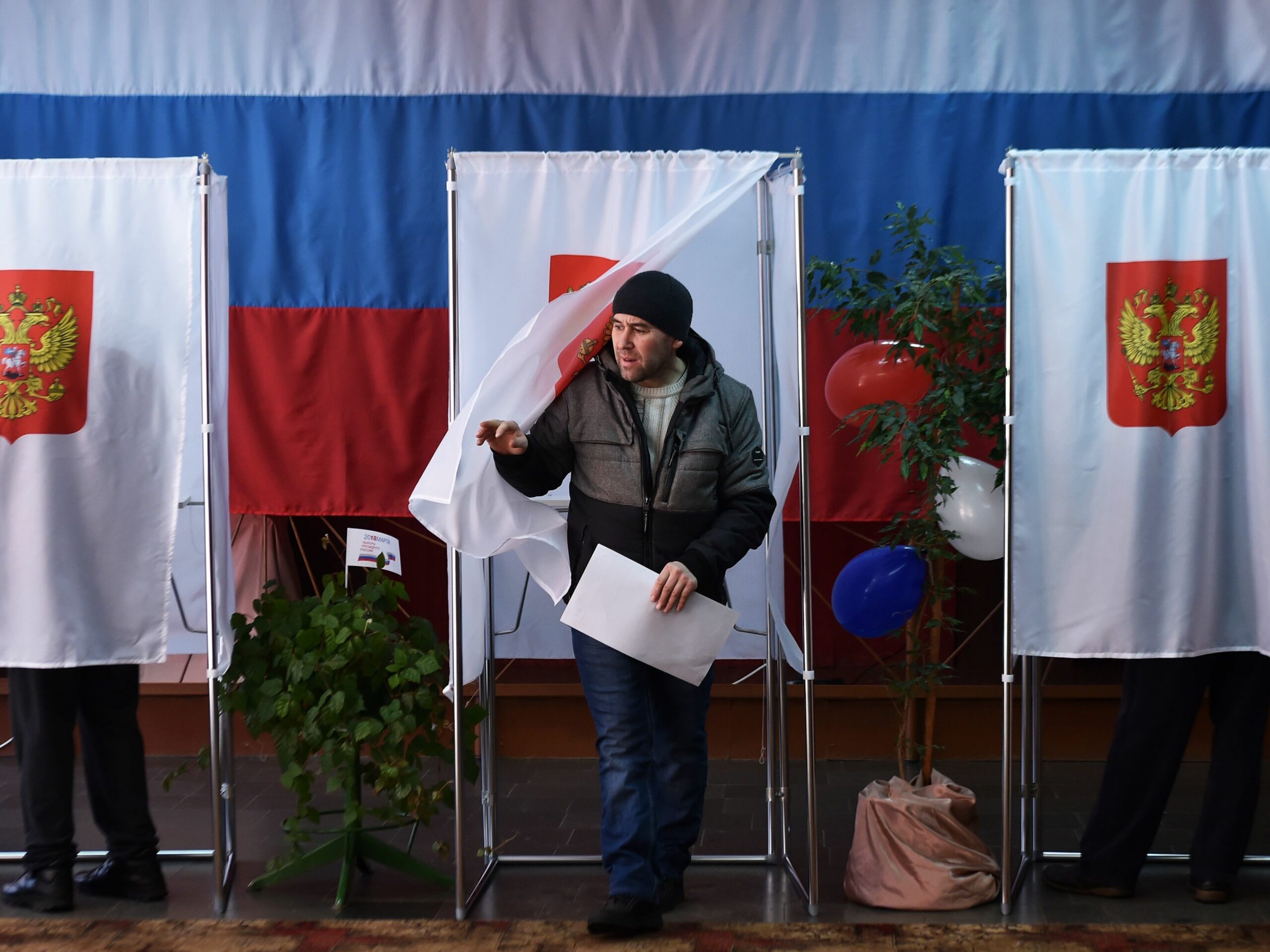
Legislative elections are currently being held in Russia between September 17-19, as 450 new members in the State Duma need to be elected.
The Central Election Commission (CEC) of the Russian Federation decided to open a record number of polling stations in the Transnistrian region – 27 polling stations, in addition to only 3 polling station opened on the right bank of the Dniester in such big cities as Chisinau, Comrat and Balti.
That is the largest number of polling stations opened by the Russian CEC in a foreign country, and five polling stations more than in the 2016 elections. Two of the polling stations were established in Tiraspol, being open from Friday to Sunday. The rest of the Russian polling stations on the Transnistrian territory are opened on Sunday only. The most astonishing fact is that no state other than Russia has ever opened polling stations in the separatist region of the Republic of Moldova. Actually, no polling stations are being opened on the Transnistrian territory when it comes to national elections of the Republic of Moldova either.
Therefore, one could say that the stakes are high when it comes to Transnistrian voters, especially since, most likely, the hopes of Russian authorities are not necessarily based on a large turnout and their real support, rather on the real possibility of electoral fraud on a territory that is not controlled by the constitutional authorities in Chisinau.
Before the presidential elections in 2018, Russian authorities announced that there are 220 thousand Russian citizens living in the Transnistrian region. That time, 24 polling stations were opened in the separatist area. Despite the fact that the Tiraspol Electoral Commission announced that, in the last year and a half alone, the voter turnout has officially fallen in the region by more than 7 700 people, the Russian CEC still decided to establish a record number of polling stations this year, which strengthened the argument about the possibility of election fraud.
Both Tiraspol’s administration and the regional media campaigned for the ruling political party United Russia and called for a high turnout at polling stations. Transnistria’s leader, Vadim Krasnoselski, urged the people on the left bank of the Dniester to come to the polls “because despite all the difficulties, Russia does not forget Transnistria and helps it as much as possible.”
It seems that the campaigning, along with the Russian sponsorship in the region, show great results during every election ballot, as Russian citizens voting in Russian elections in Transnistria are a more active electorate than Moldovan citizens residing in Transnistria and voting in the Moldovan elections at the polling stations arranged on the other bank of the Dniester, especially for them. In the previous Russia’s legislative elections, 56 thousand people voted in Transnistria, while just under 29 thousand inhabitants of the Transnistrian region voted in the recent Moldova’s parliamentary elections.
Before every election ballot held in the Russian Federation, Moldovan authorities make statements, suggesting the Russian side to abstain from opening polling stations in Transnistria, whereas Russian authorities ignore them every time.
This year, the Ministry of Foreign Affairs and European Integration of the Republic of Moldova also sent a note of protest against opening the polling stations in Transnistria. “The Ministry of Foreign Affairs and European Integration regrets that, despite the position consistently expressed by the Moldovan authorities, the Russian side acted in a manner that does not correspond to the principle of sovereignty and territorial integrity of the Republic of Moldova and the bilateral legal framework.”
The Ministry representatives noted that Russian authorities were informed of the lack of impediments to open polling stations in localities under the control of Moldova’s constitutional authorities and requested the Russian side to refrain from opening the 27 polling stations in the localities of the breakaway region, given the impossibility of ensuring the necessary security conditions for the current elections.
Moscow’s Central Election Commission also opened nine polling stations in Abkhazia and ten in South Ossetia – two disputed territories that were internationally recognised by Russia and a few more countries, while considered under military occupation, according to the Georgian Government. These lands, that are under the exclusive control of Russia, offer good opportunities to ‘correct’ any uncomfortable results obtained in the country, where the ruling political party no longer enjoys as much support as it wants to appear.
Photo: wjct.org








